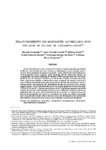Use este identificador para citar ou linkar para este item:
http://www.alice.cnptia.embrapa.br/alice/handle/doc/909202| Título: | Fracionamento de manganês acumulado nos tecidos de mudas de caramboleira. |
| Autoria: | HERNANDES, A.  CAZETTA, J. O.   NATALE, W.   ROZANE, D. E.   SOUZA, H. A. de   ROMUALDO, L. M.   |
| Afiliação: | Amanda Hernandes, Pós-Graduanda, Universidade Estadual Paulista, FCAV/UNESP, Jaboticabal, SP.; Jairo Osvaldo Cazetta, FCAV/UNESP; William Natale, FCAV/UNESP; Danilo Eduardo Rozane, UNESP; HENRIQUE ANTUNES DE SOUZA, CNPC; Liliane Maria Romualdo, Pós-graduanda, FZEA/USP. |
| Ano de publicação: | 2011 |
| Referência: | Revista Brasileira de Ciência do Solo, Viçosa, MG, v. 35, p. 1679-1685, 2011. |
| Conteúdo: | Resumo: A caramboleira (Averrhoa carambola) tende a acumular grande quantidade de Mn nos seus tecidos, mas são escassas as informações sobre a forma como o excesso desse nutriente permanece na planta. Com o objetivo de contribuir para o esclarecimento desse aspecto, neste trabalho foram cultivadas mudas de caramboleira em solução nutritiva de Furlani (1999) com concentrações crescentes de Mn (0; 0,5; 25; e 50 mg L-1 de Mn), e aos 30, 60, 90 e 120 dias os tecidos de caule, folha e raiz foram colhidos e submetidos a uma sequência de soluções extratoras: água, DTPA (ácido dietilenotriaminopentacético) e HCl (ácido clorídrico) 1 mol L-1, com posterior determinação da quantidade de Mn nos extratos e nos tecidos remanescentes. Foram encontrados teores crescentes de Mn nos extratos de água, DTPA e HCl 1 mol L-1. A maior parte (cerca de 50 %) do Mn permaneceu no tecido vegetal, mesmo após subsequentes extrações com as diferentes soluções extratoras, indicando que essa parte está fortemente ligada aos tecidos. Os maiores teores de Mn foram encontrados nas raízes e, os menores, no caule e nas folhas, sugerindo que a caramboleira tende a fixar o Mn nas raízes, possivelmente como mecanismo para limitar o transporte para a parte área, evitando a intoxicação da planta. [Fractionation of manganese accumulated in tissue of star fruit plantlets]. Abstract: Star fruit (Averrhoa carambola) plants tend to accumulate significant amounts of Mn in their tissues. However, information regarding the form in which the plant stores the excess is scarce. For a deeper understanding of this aspect, star fruit plantlets were grown in nutritive solutions of Furlani (1999) with increasing levels of Mn (0, 0.5, 25 and 50 mg L-1), and after 30, 60, 90 and 120 days the tissues were collected and subjected to a sequence of extracting solutions: water, DTPA (diethyltriaminepentacetic acid), and HCl (chloridric acid) 1 mol L-1. Then, Mn was determined in the extracts and remaining tissues. Increasing Mn concentrations were found in the extracts with water, DTPA and HCl. The greatest part of Mn (about 50 %) was detected in the remaining tissues, even after successive extractions with the different solutions, suggesting a strong linkage to plant tissues. Highest Mn concentrations were found in the roots, then the stalk and the leaf tissues, suggesting that star fruit plants tend to fix Mn in the root tissues, which is possibly a defense mechanism to limit Mn transport to the aerial part, to avoid plant intoxication. |
| Thesagro: | Averrhoa carambola Manganês |
| Palavras-chave: | Tolerância Caramboleira Micronutriente |
| Digital Object Identifier: | http://dx.doi.org/10.1590/S0100-06832011000500022 |
| Tipo do material: | Artigo de periódico |
| Acesso: | openAccess |
| Aparece nas coleções: | Artigo em periódico indexado (CNPC)  |
Arquivos associados a este item:
| Arquivo | Descrição | Tamanho | Formato | |
|---|---|---|---|---|
| APIFracionamentodemanganes.pdf | 908,24 kB | Adobe PDF |  Visualizar/Abrir |









